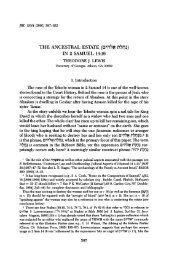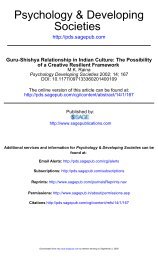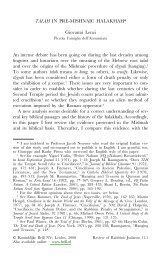Religion, Theology, and Philosophy on the Way to Being and Time ...
Religion, Theology, and Philosophy on the Way to Being and Time ...
Religion, Theology, and Philosophy on the Way to Being and Time ...
Create successful ePaper yourself
Turn your PDF publications into a flip-book with our unique Google optimized e-Paper software.
I. M. Fehér / Research in Phenomenology 39 (2009) 99–131 111<br />
stress up<strong>on</strong> “das His<strong>to</strong>rische” without Dil<strong>the</strong>y’s infl uence. 27 Heidegger suggests<br />
that <strong>the</strong> basic eff ort of life-philosophy is correct, he seems even <strong>to</strong> share <strong>the</strong><br />
view of c<strong>on</strong>temporary philosophy that <strong>the</strong> object primarily <strong>to</strong> be approached<br />
<str<strong>on</strong>g>and</str<strong>on</strong>g> investigated is “life.” 28 What he objects <strong>to</strong> <str<strong>on</strong>g>and</str<strong>on</strong>g> disapproves of is that ra<strong>the</strong>r<br />
than developing c<strong>on</strong>ceptual means adequate <strong>to</strong> its ownmost object, i.e., “life,”<br />
life-philosophy relies up<strong>on</strong> <strong>the</strong> <strong>to</strong>ols of <strong>the</strong> adversary for its own c<strong>on</strong>cepts. 29<br />
Th at is also <strong>the</strong> reas<strong>on</strong> why, having realized that <strong>the</strong> <strong>to</strong>ols are not equal <strong>to</strong> <strong>the</strong><br />
task, life-philosophers tend <strong>to</strong> come inevitably <strong>to</strong> <strong>the</strong> c<strong>on</strong>clusi<strong>on</strong> that life, his<strong>to</strong>ry,<br />
<str<strong>on</strong>g>and</str<strong>on</strong>g> existence are irrati<strong>on</strong>al. 30 Th e point Heidegger makes could be put as<br />
hen darauf bewegt ich diese Kritik” [italics in original]); GA 61: 7; GA 17: 301, 320; GA 64: 7ff .;<br />
SZ 46f. See also Heidegger’s retrospective remark GA 66: 412.<br />
27) For Heidegger’s stress <strong>on</strong> <strong>the</strong> his<strong>to</strong>rical see GA 9: 31, 32f., 36, 38; GA 56/57: 85, 88f., 117,<br />
206; GA 61: 1, 76, 111, 159, 163; GA 63: 83, 107; GA 60: 31ff . <str<strong>on</strong>g>and</str<strong>on</strong>g> passim. Heidegger frequently<br />
spoke of Dil<strong>the</strong>y’s appreciati<strong>on</strong> of Husserl (see, for example, GA 56/57: 165; GA 20: 30);<br />
this may have led him <strong>to</strong> think that what he was called <strong>to</strong> do was <strong>to</strong> unite <strong>the</strong> impulses of both<br />
thinkers.<br />
28) See GA 17: 112 <str<strong>on</strong>g>and</str<strong>on</strong>g> <strong>the</strong> references in note 24 above. Th at philosophy has life as its subject<br />
matter appears clearly in a passage of SZ also, where Heidegger suggests that <strong>the</strong> expressi<strong>on</strong><br />
“philosophy of life” amounts <strong>to</strong> nothing more than “botany of plants”—really a ple<strong>on</strong>asm—<str<strong>on</strong>g>and</str<strong>on</strong>g><br />
that in a genuine “philosophy of life” “<strong>the</strong>re lies an unexpressed tendency <strong>to</strong>wards an underst<str<strong>on</strong>g>and</str<strong>on</strong>g>ing<br />
of Dasein,” that is, existential analytic (SZ 46/BT 72 [=<strong>Being</strong> <str<strong>on</strong>g>and</str<strong>on</strong>g> <strong>Time</strong>, trans. John Macquarrie<br />
<str<strong>on</strong>g>and</str<strong>on</strong>g> Edward Robins<strong>on</strong> (New York: Harper & Row, 1962)]; see also GA 64: 40). For an<br />
anticipati<strong>on</strong> of this see GA 9: 14f.<br />
29) See Heidegger’s use of <strong>the</strong> term “Begriff ssurrogat” (GA 9: 10).<br />
30) See GA 61: 82 (“kommt es nicht zur aneignenden Aufhebung der positiven Tendenzen der<br />
modernen Lebensphilosophie” [italics in origina]); 117 (“Damit ist eine innerhalb der Lebensphilosophie<br />
unausdrücklich lebendige Tendenz ergriff en”); GA 9: 4, 13f. (“Die Lebensphilosophie,<br />
vor allem eine solche v<strong>on</strong> der Höhenstufe Dil<strong>the</strong>ys . . . muß auf ihre positiven Tendenzen<br />
befragt werden, daraufhin, ob in ihr nicht doch, wenn auch ihr selbst verdeckt und mit traditi<strong>on</strong>ell<br />
aufgeraff ten, statt ursprünglich geschöpften Ausdrucksmitteln, eine radikale Tendenz des<br />
Philosophierens vorwagt. Im Absehen darauf bewegt ich diese Kritik” [italics in original]);<br />
GA 58: 3 (“Was heißt: ‘Leben in Begriff e fassen’ . . . ‘in Worte bringen’, wo doch die Worte als<br />
volle Ausdrücke zugeschnitten sein sollen auf unsere Umwelt, auf den Raum”); 231f. (“Es ist ein<br />
in der gegenwärtigen Philosophie viel vertretener St<str<strong>on</strong>g>and</str<strong>on</strong>g>punkt, daß das faktische Leben dem<br />
Begriff gänzlich unzugänglich sei. Aber das ist nur die Kehrseite des Rati<strong>on</strong>alismus dieser Philosophie”);<br />
GA 59: 154 (“Die Lebensphilosophie ist für uns eine notwendige Stati<strong>on</strong> auf dem<br />
Wege der Philosophie, im Gegensatz zur leer formalen Transzendentalphilosophie”); GA 60: 50<br />
(“Der Begriff des Lebens ist ein vieldeutiger und v<strong>on</strong> diesem ganz allgemeinen, formalen<br />
Gesichtspunkt aus hätte eine Kritik der heutigen Lebensphilosophie einen Sinn. Nur wenn es<br />
gelingt, diesen Begriff ursprünglich positiv zu fassen, ist eine Kritik berechtigt, in einem <str<strong>on</strong>g>and</str<strong>on</strong>g>eren<br />
Sinn aber nicht, s<strong>on</strong>st verkennt sie die eigentlichen Motive der Lebensphilosophie”); GA 63: 69<br />
(“Die Tendenz der Lebensphilosophie muß aber doch im positiven Sinne genommen werden als<br />
Durchbruch einer radikaleren Tendenz des Philosophierens, obgleich die Grundlage ungenügend







